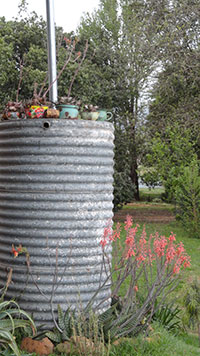Water Wise Gardening
Count every drop, because every drop counts…
For many of us the recent drought forced us to look at how we garden differently. Our office had such an overwhelming amount of requests for more information and tips that we thought it helpful to publish a bit of background information as well guidelines for water wise gardening.
 Contrary to what most might expect, the green industry is busier than ever. Everyone wants to be more ecological and water wise. Some resort to extreme measures like paving and removing gardens altogether, but that would be ecological suicide. Gardens control our microclimates, and the hotter we make our gardens with heat absorbing materials the more we are becoming part of the problem and not the solution. We need gardens, now more than ever. The current situation just forces us to approach them like we should have ages ago.
Contrary to what most might expect, the green industry is busier than ever. Everyone wants to be more ecological and water wise. Some resort to extreme measures like paving and removing gardens altogether, but that would be ecological suicide. Gardens control our microclimates, and the hotter we make our gardens with heat absorbing materials the more we are becoming part of the problem and not the solution. We need gardens, now more than ever. The current situation just forces us to approach them like we should have ages ago.
The number one thing homeowners did wrong for years is not taking care of soils. Soil is a sensitive ecosystem and our most valuable resource. Soils need 4 basic things: Compost which acts like a sponge to retain moisture and nutrients for longer and improves the soil texture. Phosphates, which is the soils natural defence against diseases and helps plants to establish. Bone meal is a more natural form of phosphate. Nutrients; Plants need added nutrients such as fertilizers. 2:3:2 is a general fertilizer that will make plants a bit stronger against the stresses of the environment. Organic fertilizers contain far less salts which will assist in better moisture retention of soils and won’t build up in soils over time to create a desert effect. And lastly soils like to be covered. Mulch helps to keep the soil cool and retain more moisture. In short, keep your soil steady and your plants will survive the drought far better. In the two extremes people force plants to over perform by adding too much, leaving plants unable to cope with environmental stresses. Or they decide to do nothing during the drought and do not provide the essential environment for plants to survive.
 You might have noticed we talk a lot about moisture. Most plants apart from a very limited range of species like moisture, and not water. Plants take up on average between 3-7% of all the water we put down. We have actually over-watered for many years. If your soil is healthy you only need to keep the balance of moisture. Too much water actually dissolve all the nutrients and is wasted. Our top tip is to get a soil moisture meter, stick it in the ground and check how moist your soil is. Water your garden for only 2-5 minutes, let it rest for about 5-10 minutes and water for an additional 2-5 minutes. This will moisten the entire soil profile and provide better results than 15-20 minutes of watering. Remember Tropical plants take up more moisture from the air, so a good mist is very effective in addition to soil watering.
You might have noticed we talk a lot about moisture. Most plants apart from a very limited range of species like moisture, and not water. Plants take up on average between 3-7% of all the water we put down. We have actually over-watered for many years. If your soil is healthy you only need to keep the balance of moisture. Too much water actually dissolve all the nutrients and is wasted. Our top tip is to get a soil moisture meter, stick it in the ground and check how moist your soil is. Water your garden for only 2-5 minutes, let it rest for about 5-10 minutes and water for an additional 2-5 minutes. This will moisten the entire soil profile and provide better results than 15-20 minutes of watering. Remember Tropical plants take up more moisture from the air, so a good mist is very effective in addition to soil watering.
Additional tips:
- Only water at the designated times when evaporation rates are low.
- House water recycling can assist in your irrigation needs.
- Keep a bucket in your shower to collect water while you are awaiting hot water and use on your potted plants when cooled down.
- Healthy lawns can survive with a little less water. Irrigate as described to moisten the profile instead of water logging.
- Create more shade by planting trees. The more shade the less heat and evaporation.
- Get a soil moisture sensor to effectively gauge if you need more water or not.
- Add mulch on your soils to create a barrier against evaporation.
- Use water saving irrigation devices instead of an open hose pipe. This will save water and also release some much needed moisture to the air.
- Open your outdoor umbrellas over hard surfaces to prevent heat build-up.
- Plant endemic. Your local hardware store may sell plants, but are they able to give you enough information on what they are selling or just keen to make a buck?
- Change to organic if you can. Organic gardens tends to be more resilient against environmental stresses, and are in a way more self-maintaining.
- Ask for help. The Irene School of Garden Design offers a short 3 day course that will help you in re-designing your garden to be more environmentally friendly.



0 Responses